|
|
|
Sort Order |
|
|
|
Items / Page
|
|
|
|
|
|
|
| Srl | Item |
| 1 |
ID:
127619
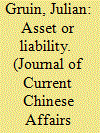

|
|
|
|
|
| Publication |
2013.
|
| Summary/Abstract |
China's financial system, dominated by the banking sector, has played a central role in the development of an imbalanced trajectory of economic development and growth. As one of the primary mechanisms for implementing decisive macro-economic policy, the banking sector has hitherto served the Chinese growth strategy well in actively allocating capital towards the investment and export sectors, whilst proving capable of managing the macro-economic ramifications of this highly inter-ventionist strategy. However, the role of the financial system in this growth strategy is also rooted in the requirement that authority over financial capital remains closely tied to state institutions and policies, due to elite concern over politico-economic instability. Based on policy analysis and qualitative interviews conducted in mid-2012, the article suggests that whilst the structure of the financial system was conducive to fostering the growth of the real economy, it will hold back not the need for rebalancing, but rather the process of rebalancing itself.
|
|
|
|
|
|
|
|
|
|
|
|
|
|
|
|
| 2 |
ID:
171449
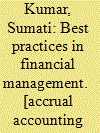

|
|
|
|
|
| Publication |
New Delhi, IDSA, 2019.
|
| Description |
82p.pbk
|
| Series |
IDSA Monograph Series no.; 66
|
| Standard Number |
9789382169895
|
|
|
|
|
|
|
|
|
|
|
|
Copies: C:2/I:0,R:0,Q:0
Circulation
| Accession# | Call# | Current Location | Status | Policy | Location |
| 059855 | 658.15/KUM 059855 | Main | On Shelf | General | |
| 059856 | 658.15/KUM 059856 | Main | On Shelf | General | |
|
|
|
|
| 3 |
ID:
088922
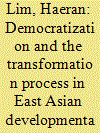

|
|
|
| 4 |
ID:
127913
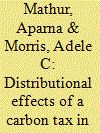

|
|
|
|
|
| Publication |
2014.
|
| Summary/Abstract |
This paper analyzes the distributional implications of an illustrative $15 carbon tax imposed in 2010 on carbon in fossil fuels. We analyze its incidence across income classes and regions, both in isolation and when combined with measures that apply the carbon tax revenue to lowering other distortionary taxes in the economy. Consistent with earlier findings, we find that a carbon tax is regressive. Using tax swap simulations, we then subtract the burden of other taxes the carbon tax revenue could displace, and compute the net effect on households under three assumptions about how capital and labor income might be distributed.
|
|
|
|
|
|
|
|
|
|
|
|
|
|
|
|
| 5 |
ID:
143390


|
|
|
|
|
| Summary/Abstract |
This paper estimates the cost and profit efficiency of the Chinese domestic banking sector to evaluate the effectiveness of China's financial reforms since 1978. We use the performance of foreign banks as the benchmark because foreign banks, subject to intensive worldwide competition, are perceived as possessing superior governing structure and organization, more advanced technologies and better trained labor force. On the other hand, competition in China's banking sector is mainly in the form of nonprice measures, thus putting foreign banks at a disadvantage. We find domestic banks have gradually caught up the cost advantage of foreign banks in a manner consistent with the increased competitive pressure. On the other hand, the profit advantage of domestic banks over foreign banks is widening because of institutional arrangements, cultural and social networks as well as the profit scope and revenue scale economy.
|
|
|
|
|
|
|
|
|
|
|
|
|
|
|
|
| 6 |
ID:
077594
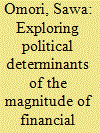

|
|
|
|
|
| Publication |
2007.
|
| Summary/Abstract |
This paper aims to empirically explore political determinants of the magnitude of financial reforms, namely, under which conditions a country is more likely to choose a 'big-bang' type of financial reform versus a gradual financial reform. Especially, how the International Monetary Fund's (IMF's) effect on the magnitude of financial reforms is conditioned by political institutions is quantitatively examined using 30 developing countries' data from 1973 to 2002. Results demonstrate that the IMF's effect on facilitating a big-bang type of financial reforms is contingent upon the number of veto players in the case of a democratic government. Also, a non-democratic government is more likely to engage in big-bang type of financial reforms than a democratic government, holding other conditions constant
|
|
|
|
|
|
|
|
|
|
|
|
|
|
|
|
| 7 |
ID:
075473


|
|
|
|
|
| Publication |
2006.
|
| Summary/Abstract |
In the aftermath of the economic crisis of 1997-1998 South Korea undertook a number of reforms in financial supervision. Questions have been raised, however, as to whether Korea has in fact succeeded in creating a system of financial supervision capable of dealing with certain risks and responding to new challenges. This article examines Korea's recent experience in financial instability resulting from misconduct by credit card companies as a case in point and argues that the postcrisis reform in financial supervision was limited to changing formal institutions for financial supervision and that further reforms will have to be undertaken in other related institutions if Korea is to improve its financial supervision.
|
|
|
|
|
|
|
|
|
|
|
|
|
|
|
|
| 8 |
ID:
099314
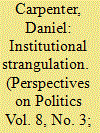

|
|
|
|
|
| Publication |
2010.
|
| Summary/Abstract |
The politics of financial reform represent a genuine test case for American politics and its institutions. The Obama administration's proposed reforms pit common (largely unorganized) interests against well-organized and wealthy minority interests. I describe how the withering and unfolding of financial reform has occurred not through open institutional opposition but through a quieter process that I call institutional strangulation. Institutional strangulation consists of much more than the stoppage of policies by aggregation of veto points as designed in the US Constitution. In the case of financial reform, it has non-constitutional veto points, including committee politics and cultural veto points (gender and professional finance), strategies of partisan intransigence, and perhaps most significantly, the bureaucratic politics of turf and reputation. These patterns can weaken common-interest reforms, especially in the broad arena of consumer protection.
|
|
|
|
|
|
|
|
|
|
|
|
|
|
|
|
| 9 |
ID:
109758


|
|
|
| 10 |
ID:
125102


|
|
|
|
|
| Publication |
2013.
|
| Summary/Abstract |
PRESIDENT OBAMA and Congress continue to wrestle with competing ideas to fix America's housing crisis, ranging from abolishing Fannie Mae and Freddie Mac to introducing new regulations for repairing the rickety mortgage-financing system years after it crashed. To understand the enduring nature of today's housing-system mess, it is not really necessary to do much more than to look backward. To look, that is, at the careers of two former prominent politicians, each of whom has played an integral role in American finance in recent decades.
|
|
|
|
|
|
|
|
|
|
|
|
|
|
|
|
| 11 |
ID:
168549
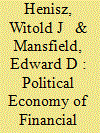

|
|
|
|
|
| Summary/Abstract |
Over the past three decades, numerous countries have engaged in financial reform, prompting widespread interest in the sources of this development. Virtually all of the studies conducted on this topic, however, have focused on explaining neoliberal policy adoption in the financial sector, without addressing whether the adopted reforms actually generate neoliberal economic outcomes. This gap in the literature is important because many policy reforms are not implemented or enforced. In this article, we conduct one of the first studies of the conditions under which de jure financial reforms are implemented, yielding de facto financial liberalization. We argue that democracy inhibits de facto financial reform when society at large is dissatisfied with government. Under these circumstances, democratic officials may be tempted to announce but not to follow through on financial policy liberalization or be unable to follow through, either fearing or facing opportunistic political opposition from legislative or partisan veto players who either represent or seek the electoral support of interest groups harmed by implementing financial reforms. Based on an analysis of ninety countries from 1980–2005 corroborated by a series of illustrative case studies, we find considerable support for this argument.
|
|
|
|
|
|
|
|
|
|
|
|
|
|
|
|
| 12 |
ID:
155869
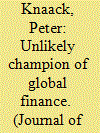

|
|
|
|
|
| Summary/Abstract |
As a G20 member, China has been engaged in financial reform since the end of the global financial crisis. A core piece of this reform is Basel III, the new prudential standard issued by the Basel Committee. Rather than being merely compliant, China’s banking regulation is stricter than the global standard and being implemented ahead of the international timetable. Why is China voluntarily subjecting itself to tougher regulatory standards than the rest of the world? This article shows that low adjustment costs, factional politics, and, above all, an unusual alignment of domestic interests in the quest for international reputation are driving this phenomenon. The troubled institutional history of China’s financial system motivates all relevant stakeholders to seek external validation in order to address a credibility gap abroad, albeit for different reasons. The article examines the power of reputation as a driver of regulatory positioning in the context of China’s integration into international financial institutions.
|
|
|
|
|
|
|
|
|
|
|
|
|
|
|
|
|
|
|
|
|